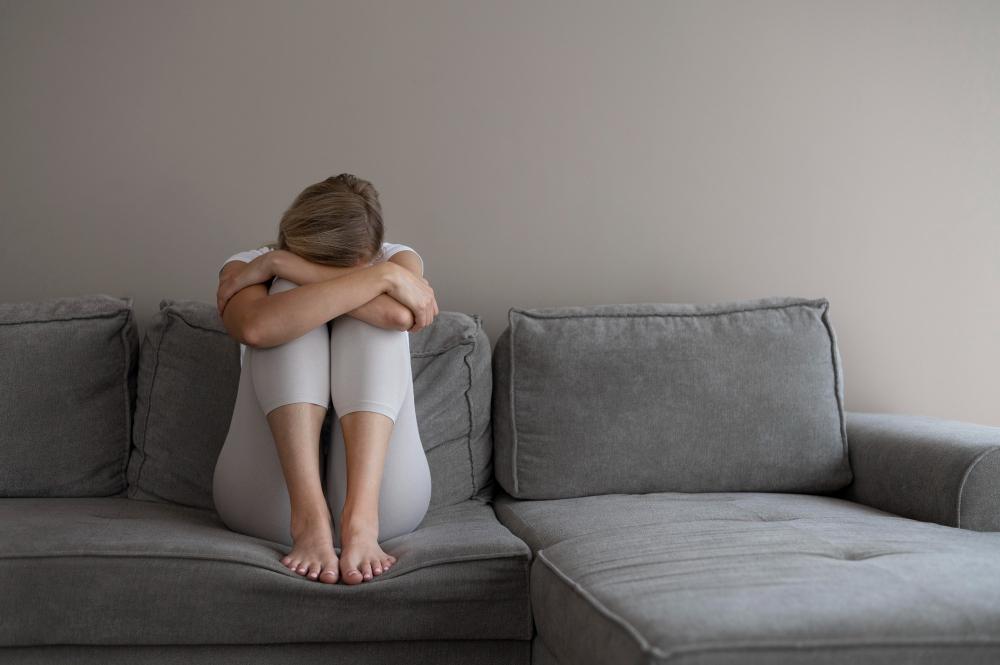Introduction: Let’s Talk About Anxiety
Everyone feels anxious sometimes—before a big meeting, exam, or a life change. But for some people, this anxious feeling sticks around too long and starts to affect daily life.
In today’s fast-paced world, where we’re constantly online and always busy, more and more people—young and old—are feeling stressed and overwhelmed.
In this blog, we’ll break down what anxiety really is, what signs to look out for, and how to manage it better. If you’re struggling, know that you’re not alone—and help is always available.
What Is Anxiety, Really?
Anxiety is more than just feeling nervous. It’s a constant feeling of fear, worry, or restlessness—even when there’s no clear reason.
Here are some common types of anxiety:
- Generalized Anxiety Disorder (GAD): Worrying a lot about daily life, even when things seem okay.
- Panic Disorder: Sudden, intense fear attacks—also called anxiety or panic attacks. You might feel like you can’t breathe or your heart is racing.
📊 In India and worldwide, anxiety is rising fast as life becomes more stressful.
Understanding anxiety is the first step to feeling better.
How to Know If You Have Anxiety
✅ Check for These Signs:
Physical Symptoms:
- Fast heartbeat
- Sweating or trembling
- Feeling dizzy
- Trouble sleeping
Emotional Symptoms:
- Feeling scared or tense all the time
- A sense of panic that’s hard to control
- Feeling restless or easily irritated
Behavioral Signs:
- Avoiding people, events, or places out of fear
- Not trying new things because of “what if” thoughts
🔁 Anxiety often mixes with depression, making things feel worse. Spotting these signs early can help prevent more serious issues.
What Causes Anxiety?
There’s no one reason, but here are a few common causes:
🧬 Biological Factors:
If someone in your family has anxiety, you might be more likely to have it too.
📱 Technology & Lifestyle:
Constant phone alerts, endless scrolling, work pressure—it all adds up.
💼 Environment & Relationships:
Stress at work, fights with loved ones, money worries—all can trigger anxiety.
Understanding what’s behind your anxiety can help you manage it better.
How Anxiety Affects Your Life
Anxiety doesn’t just affect your mind—it shows up in every part of life.
- At Work or School: Hard to focus, procrastination, fear of failure
- In Relationships: You may overthink, pull away, or have trouble opening up
- In Your Body: Anxiety can cause headaches, stomach issues, poor sleep, and fatigue
💡 That’s why managing anxiety isn’t just about feeling better emotionally—it’s about improving your whole life.
Natural & Holistic Ways to Cope
You don’t always need medicine to start feeling better. Try these simple tools:
🧘♀️ Mindfulness & Meditation: Calms the mind and brings focus
🥦 Healthy Eating: Food affects your mood—eat clean, balanced meals
🏃♂️ Exercise: A daily walk or yoga session can lift your mood naturally
🌿 Ayurveda & Yoga: These Indian wellness practices help balance your body and mind
Little changes every day can lead to big improvements over time.
Easy Stress-Relief Tools You Can Try
Here are a few ways to relax when anxiety shows up:
- Deep Breathing: Slow, deep breaths calm your body and mind
- Journaling: Write out your worries—you’ll feel lighter
- Stress Apps: Apps like Headspace or Calm offer guided meditations and exercises
📅 Try adding one of these into your daily routine to build emotional strength.
When to Get Professional Help
If anxiety is stopping you from living your life fully, it’s time to talk to a professional. There’s nothing weak about asking for help.
Therapy can help with:
- Understanding your thoughts
- Learning to manage triggers
- Feeling more in control
Treatment Options Include:
- Cognitive-Behavioral Therapy (CBT): A popular and effective talk therapy
- Medication: Sometimes needed for severe cases, under a doctor’s care
🧠 A therapist or counselor can guide you toward the right support.
Helping a Loved One With Anxiety
If someone close to you is struggling, here’s how you can support them:
- 👂 Listen without judging
- 💬 Encourage them to open up
- 🤝 Offer help in finding a counselor or therapist
Being there for someone makes a big difference.
In Conclusion: There Is Hope
Anxiety is hard, but it’s manageable. With support—whether from friends, family, or professionals—you can feel better.
🌟 The more we talk about mental health, the less scary it becomes.
You’re not alone, and there’s no shame in needing help. Take that first step—whether it’s a small change in your routine or reaching out to a therapist. Healing is possible.
Want to take the next step?
Start by talking. Start by understanding. And remember:
Anxiety doesn’t define you—you can take control.

